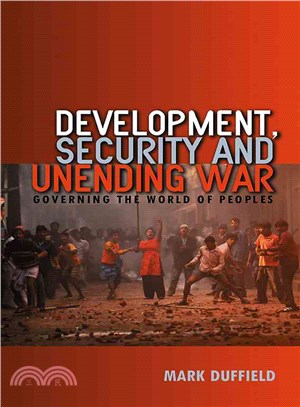| FindBook |
有 1 項符合
DEVELOPMENT, SECURITY AND UNENDING WAR的圖書 |
 |
Development, Security And Unending War - Governing The World Of Peoples 作者:DUFFIELD 出版社:BLACKWELL PUB 出版日期:2007-10-03 規格:22.9*20.3*1.9cm |
| 圖書館借閱 |
| 國家圖書館 | 全國圖書書目資訊網 | 國立公共資訊圖書館 | 電子書服務平台 | MetaCat 跨館整合查詢 |
| 臺北市立圖書館 | 新北市立圖書館 | 基隆市公共圖書館 | 桃園市立圖書館 | 新竹縣公共圖書館 |
| 苗栗縣立圖書館 | 臺中市立圖書館 | 彰化縣公共圖書館 | 南投縣文化局 | 雲林縣公共圖書館 |
| 嘉義縣圖書館 | 臺南市立圖書館 | 高雄市立圖書館 | 屏東縣公共圖書館 | 宜蘭縣公共圖書館 |
| 花蓮縣文化局 | 臺東縣文化處 |
|
|
- 圖書簡介
According to politicians, we now live in a radically interconnected world. Unless there is international stability – even in the most distant places – the West's way of life is threatened. In meeting this global danger, reducing poverty and developing the unstable regions of the world are now imperative. In what has become a truism of the post-Cold War period, security without development is questionable, while development without security is impossible.
In this accessible and path-breaking book, Mark Duffield questions this conventional wisdom and lays bare development not as a way of bettering other people but of governing them. He offers a profound critique of the new wave of Western humanitarian and peace interventionism, arguing that rather than bridging the lifechance divide between development and underdevelopment, it maintains and polices it. As part of the defence of an insatiable mass consumer society, those living beyond its borders must be content with self-reliance.
With case studies drawn from Mozambique, Ethiopia and Afghanistan, the book provides a critical and historically informed analysis of the NGO movement, humanitarian intervention, sustainable development, human security, coherence, fragile states, migration and the place of racism within development. It is a must-read for all students and scholars of development, humanitarian intervention and security studies as well as anyone concerned with our present predicament. - 作者簡介
Mark Duffield is Professor of Development Politics at the University of Bristol.
- 名人/編輯推薦
"This book should certainly appear on reading lists as an important counterpoint to more optimistic liberal internationalist and cosmopolitan approaches."
Times Higher Education
"Duffield s book turns the liberal vision of the world upside down."
Survival
"A very thought-provoking and insightful work which is warmly recommended to everybody with an engagement or interest in development policies."
Economics of Peace and Security Journal
"Mark Duffield has written a brilliant book which draws together the strings of the end of the Cold War, the securitization of politics, the development of a neo-liberal discourse of humanitarian intervention, and the fusion of the national and the international. Particularly compelling is his contrarian view of the consequences of the liberation of the UN from the shackles of the Cold War."
Janice Stein, University of Toronto
"Once again, Mark Duffield has gone beyond the platitudes of 'development speak', 'security speak' and 'humanitarian speak'. The book is crammed with insights and with challenges to received wisdom."
David Keen, London School of Economics and Political Science
"Humanitarian and development aid and actors as counterinsurgency: in this carefully documented but devastating analysis of the people-centred technology of security for the West since the mid-1990s and its historical context, Duffield provides both practitioners and scholars with an interpretive framework for the new North South division and consequences of liberal internationalism that is original and challenging and which demands serious debate."
Susan L. Woodward, City University of New York - 目次
Preface.
Chapter 1 INTRODUCTION: DEVELOPMENT AND SURPLUS LIFE .
The liberal problematic of security.
Biopolitics, liberalism and development.
Surplus population and accumulation by dispossession.
Slavery and excess freedom.
The biopolitics of development and underdevelopment.
Dividing insured and non-insured peoples.
From internal war to global instability.
Occupation and contingent sovereignty.
Disturbing the boundaries of time and space.
Chapter 2: PERMANENT EMERGENCY AND DECOLONISATION .
Total war and the paradox of biopolitics.
NGOs and total war.
The colonial inheritance.
Expansion without imperial reconciliation.
Emergency and the dilemma of development.
Cold War liminality and non-state sovereignty.
Sustainable development: knowledge makes free.
The question of agency: being the right type.
Postscript.
Chapter 3: THE EMERGENCE OF CONTINGENT SOVEREIGNTY.
From modernisation to sustainable development.
Emergency and contingent sovereignty.
Negotiated access and the humanitarian boom.
Emergency and the external sovereign frontier.
Chapter 4: MOZAMBIQUE, GOVERNMENTALISATION AND NON-MATERIAL DEVELOPMENT.
The background to a ‘complex emergency’.
The changing relationship with NGOs.
War and the destruction of culture.
The re-emergence of social cohesion.
Opposing economic differentiation.
Non-material development.
Gender, natural economy and land.
Concluding remarks.
Chapter 5: HUMAN SECURITY AND GLOBAL DANGER.
Human security as a technology of governance.
Internal war and the crisis of containment.
Globalising versus containing tendencies.
Reinstating the state.
Containing underdevelopment.
Unending war, human security and NGOs.
Chapter 6: AFGHANISTAN, COHERENCE AND TALIBAN RULE.
From negotiation to coercion.
The strategic framework for Afghanistan.
Development and security in practice.
Aid and peace-building in a failed state.
The limits of principled engagement.
Problematising state-based politics.
UNSMA and the critique of aid.
Concluding Remarks.
Chapter 7: FRAGILE STATES AND NATIVE ADMINISTRATION.
Fragility and global instability.
Contingent sovereignty and non-material development.
The governance state.
The fragile state and liberal imperialism.
Reintroducing native administration.
Culture and the limits of government.
The necessity of despotism.
Adjusting government to culture.
Technologies of post-interventionary governance.
Concluding remarks.
Chapter 8: RACISM, CIRCULATION AND SECURITY.
The collapse of the national/international dichotomy.
From race war to racism.
Liberalism, imperialism and culture.
Decolonisation and the new racism.
Racism and anti-racism.
Conjoining the internal and external frontiers.
Migration and the European state of exception.
The changing regime of internal development.
Concluding remarks.
Chapter 9: CONCLUSION: FROM CONTAINMENT TO SOLIDARITY.
The biopolitics of insured and non-insured life.
Development and Emergency.
Governmentalising petty sovereignty.
The biopolitics of unending war.
Is there an alternative development?.
The solidarity of the governed.
.
BIBLIOGRAPHY
|











